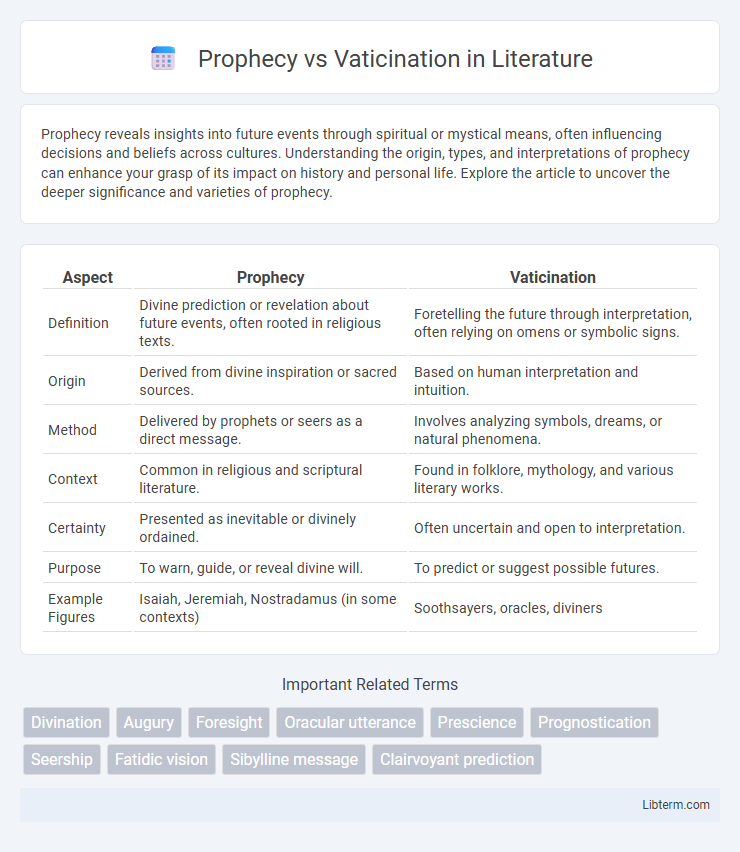Prophecy reveals insights into future events through spiritual or mystical means, often influencing decisions and beliefs across cultures. Understanding the origin, types, and interpretations of prophecy can enhance your grasp of its impact on history and personal life. Explore the article to uncover the deeper significance and varieties of prophecy.
Table of Comparison
| Aspect | Prophecy | Vaticination |
|---|---|---|
| Definition | Divine prediction or revelation about future events, often rooted in religious texts. | Foretelling the future through interpretation, often relying on omens or symbolic signs. |
| Origin | Derived from divine inspiration or sacred sources. | Based on human interpretation and intuition. |
| Method | Delivered by prophets or seers as a direct message. | Involves analyzing symbols, dreams, or natural phenomena. |
| Context | Common in religious and scriptural literature. | Found in folklore, mythology, and various literary works. |
| Certainty | Presented as inevitable or divinely ordained. | Often uncertain and open to interpretation. |
| Purpose | To warn, guide, or reveal divine will. | To predict or suggest possible futures. |
| Example Figures | Isaiah, Jeremiah, Nostradamus (in some contexts) | Soothsayers, oracles, diviners |
Understanding Prophecy: Definition and Origins
Prophecy refers to the divine or inspired revelation of future events, often rooted in religious or spiritual traditions, while vaticination generally denotes the act of predicting or foretelling without necessarily invoking a divine source. The origins of prophecy are deeply embedded in ancient cultures, where prophets served as intermediaries communicating the will or messages of gods to humanity. Understanding prophecy involves exploring its theological foundations, historical contexts, and the linguistic distinctions that separate it from secular forecasting or vaticination.
What Is Vaticination? Semantic Nuances Explored
Vaticination refers to the act of predicting or foretelling future events, often based on interpretation, intuition, or inspiration rather than divine revelation. Whereas prophecy commonly implies a message communicated by a deity or supernatural source, vaticination emphasizes human insight and speculative foresight. The semantic nuance highlights vaticination as a broader, less authoritative form of prediction distinguished from prophetic declarations rooted in religious tradition.
Historical Roots: Prophecy in Ancient Cultures
Prophecy in ancient cultures served as a critical means of divine communication, often involving oracles, seers, and shamans who interpreted messages from gods or spirits to guide societal decisions. Unlike vaticination, which generally refers to predicting future events through observation or intuition without divine intervention, prophecy was deeply embedded in religious and ritualistic contexts across civilizations such as Mesopotamia, Egypt, and Greece. These historical roots highlight prophecy's role in shaping political, social, and spiritual frameworks by providing authoritative foresight believed to originate from supernatural sources.
The Evolution of Vaticination Through the Ages
Vaticination, originating from the Latin term "vaticinari," has evolved significantly from ancient oracular declarations to structured methods of divination in medieval and Renaissance periods. This progression reflects a shift from vague, spontaneous prophetic utterances to systematically interpreted signs and symbols, integrating astrological, mystical, and psychological insights. Modern vaticination blends traditional practices with contemporary technologies, transforming into a multidisciplinary approach to foretelling future events.
Key Differences: Prophecy vs Vaticination
Prophecy refers to the inspired prediction of future events often attributed to divine revelation, while vaticination denotes the act of foretelling or divining the future without necessarily implying divine origin. Prophecy typically involves a message delivered by a prophet with spiritual authority, whereas vaticination encompasses a broader range of predictive practices, including those based on intuition or ritualistic methods. The key difference lies in prophecy's association with sacred or religious context, contrasting with vaticination's secular or mystical nature.
The Role of the Divine in Prophecy and Vaticination
Prophecy involves receiving messages directly from a divine source, positioning the divine as an active communicator revealing future events or divine will. Vaticination, however, often relies on human interpretation of omens, signs, or natural phenomena without explicit divine intervention. The role of the divine in prophecy is central and authoritative, while in vaticination it is more implicit or symbolic, reflecting different understandings of divine interaction with humanity.
Methods and Mediums: How Prophecies and Vaticinations Are Delivered
Prophecy is often conveyed through divine inspiration, typically delivered by prophets who receive visions, dreams, or direct communication from a deity, using sacred texts or oral declarations as mediums. Vaticination involves various methods such as divination tools--tarot cards, runes, astrology charts--and rituals performed by seers or oracles to interpret signs and predict future occurrences. Both practices rely on specific mediums and techniques: prophecy emphasizes spiritual revelation, while vaticination employs symbolic interpretation and formalized methods.
Cultural Impact: Influence on Society and Beliefs
Prophecy and vaticination have significantly shaped cultural frameworks, influencing societal values, decision-making, and collective beliefs across civilizations. Prophecy, often regarded as divinely inspired, reinforces faith systems and legitimizes leadership, while vaticination, associated with interpreting omens or celestial phenomena, informs ritual practices and personal guidance. This dual role underlines their enduring impact on historical narratives and contemporary cultural identities.
Prophecy and Vaticination in Modern Literature and Media
Prophecy in modern literature often appears as a pivotal plot device that foreshadows future events with a mystical or divine origin, shaping character destinies and narrative arcs, as seen in works like J.K. Rowling's *Harry Potter* series. Vaticination, though similar, typically conveys a broader or more ambiguous prediction, frequently utilized in speculative fiction and media to create suspense or explore themes of fate and free will. Contemporary media blends both concepts to deepen storytelling, reflecting cultural fascination with destiny, knowledge, and the unknown.
Interpreting the Future: Relevance in Contemporary Times
Prophecy involves divinely inspired revelations about the future, often rooted in religious or spiritual traditions, whereas vaticination relies on human intuition or symbolic interpretation without explicit divine authority. In contemporary times, prophecy remains significant within faith communities as a source of moral guidance, while vaticination appeals to secular audiences through practices like tarot reading and astrology for personal insight. Understanding these distinctions highlights how cultures interpret the future differently, blending ancient beliefs with modern psychological needs.
Prophecy Infographic

 libterm.com
libterm.com